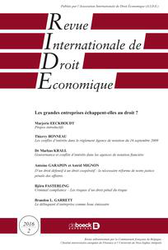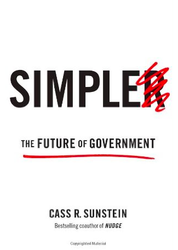June 10, 2020
Thesaurus : Doctrine

Full reference : Fasterling, B., "Criminal Compliance - Les risques d'un droit pénal du risque", Revue internationale de droit économique, 2016/2 (t.XXX), p. 217-237
Aug. 1, 2016
Breaking news

Cass R. Sunstein is a prominent Law & Economics teacher (first at the University of Chicago, then at Harvard). Not only has he written reference handbooks on Regulation, he was also the one who inspired the Regulation policies of Obama. In his 2013 book Simpler, he expresses his stance: to be better, public policies need to be simpler.
In this essay, Sunstein explores how behavorial economics might lead to improve public decision-making processes. He bases its stances upon his experience as the Administrator, from 2009 to 2012, of the US Office of Information and Regulatory Affairs; that is why anyone who cares about Regulation should read it and ask themselves if simplicity, as the author states, may or may not be an actual leading principle for an effective government.
The OIRA, under the supervision of the Office of Management and Budget placed within the Executive Office, reviews the draft Regulations that are prepared by the cabinets of various rulemaking agencies. In this view, the OIRA can be regarded as a sort of custodian of the quality of Regulation throughout the US; conversely to the mainly consultative functions granted to the Conseil d'Etat in France, the OIRA's opinions are binding. Hence, a draft project shall not be issued nor be enforced without its prior consent. Part of OIRA's defining mission is also to centralize all the information held by diverse people within the executive branch, as to enable its access and circulation between all the rulemaking agencies responsible for elaborating and producing binding regulations.
Simpler is dedicated to the detailed study of the main decisions taken under Sunstein's decisive influence by the OIRA in the Regulation field during Obama's first mandate (2009-2012). Before taking up government functions, Sunstein focused part of his academic work on the interactions that are the most likely to occur between behavioral economics, law and public policy. To him, "a general lesson is that small, inexpensive policy initiatives, informed by behavioral economics, can have big benefits" (p. 41). He namely provides that "without a massive reduction in its current functions, government can be far more effective, far less confusing, far less counterproductive, and far more helpful if it opts, wherever it can, for greater simplicity" (p. 11).
This reference to 'simplicity', from which the name of Sunstein's essay stems, aims at translating all the efforts done by public authorities, under the supervision of the OIRA, to issue rules that were clearer and more accessible than before and that provided their subjects (whether they are citizens, companies, or federal administrations) a greater freedom in the choices they were able to make.
Throughout his book and with a little help from the various situations he had to face during his term at the OIRA, Sunstein shows that there is a virtuous relationship between a better information of the agents (whether they are the authors or the subjects of the norms at stake), a greater simplicity in public decision-making process and a better quality of the regulations meilleure qualité de la réglementation in force in a State. This paper hence aims to sum up the main points of the essay (I.), before making a few comments about it (II.).
(See below)

March 27, 2015
Sectorial Analysis

The cost issue of regulation is a recurring issue.
One can complain specifically, when companies are protesting about the "cost of regulation" or when the topic is taken as an object of study, through the cost / benefit calculation.
A practical question of importance is whether there is a "legal question" or not.
The "juridicity" of a question is defined by the fact that discussing about this question has an effect on the outcome of a case before a judge. This concrete definition, leaving the judge's power, binding nature of the rule (here the balance between cost and benefit) the effectiveness of its decision before the judge, its consideration by him in the decision he makes, has been proposed in France by Carbonnier. It is opposed to a definition of Law by the source, the author of the rule, which identifies law for example through Parliament Acts, because the text is adopted by the legislator, listed source of law.
The first definition, more sociological, more flexible, giving the spotlight on judge better corresponds to a legal system which gives more room for ex post and for the judge. It is logical that we find more demonstrations of this conception in the common law systems.
However, the issue of cost / benefit is being debated before the Supreme Court of the United States, about the latest environmental regulations, adopted by the Environment Protection Agency (EPA). It is a question of law. It is under the empire of the judge.
For it is in this light that President Barack Obama in November 2014 asked a very costly regulation, and it was under his leadership that the Environmental Protection Agency has developed texts. Indeed, pollution of certain plants are the cause of asthma and laid in public health imperative to fight a regulation that results in a direct cost on firms. Indeed, some plants pollution is the cause of asthma and President Obama has asked public health imperative to combat by a regulation that results in a direct cost on the industry. The regulations adopted in 2012 they cost a $ 9 million, some claiming that future ones could result in billions of costs directly related to business The President emphasized by stating that the health of children was priceless.
By challenging those of 2012 before the Supreme Court, in the case Michigan v. EPA, this is the other texts that conservative states and companies have in mind because it is the principle that is posed: : does A regulator have the right to take regulations very "expensive" when the advantage, however legitimate it is, is small-scale in terms of costs? The Supreme Court, having chosen to handle the case, listened to March 25, 2015, the arguments of each other and discussed the case.
The question is the integration or not into the constitutional notion of "necessity of the law" of the "cost / benefit" calculation. This is a crucial point because the concept of "necessity of the law" is a common notion to the constitutions of many countries.
However, not only the so-called judges "conservatives" as Justice Antonio Scalia, took position felt it was crazy not "consider" the cost of new regulations from the expected health benefits, but also Justice Stephen Breyer called "progressive," said "irrational" the environmental regulator has not taken in consideration such an imbalance between cost and benefit.
It is true that Justice Breyer was formerly professor of competition law at Harvard.
Judgment will be given in June.
